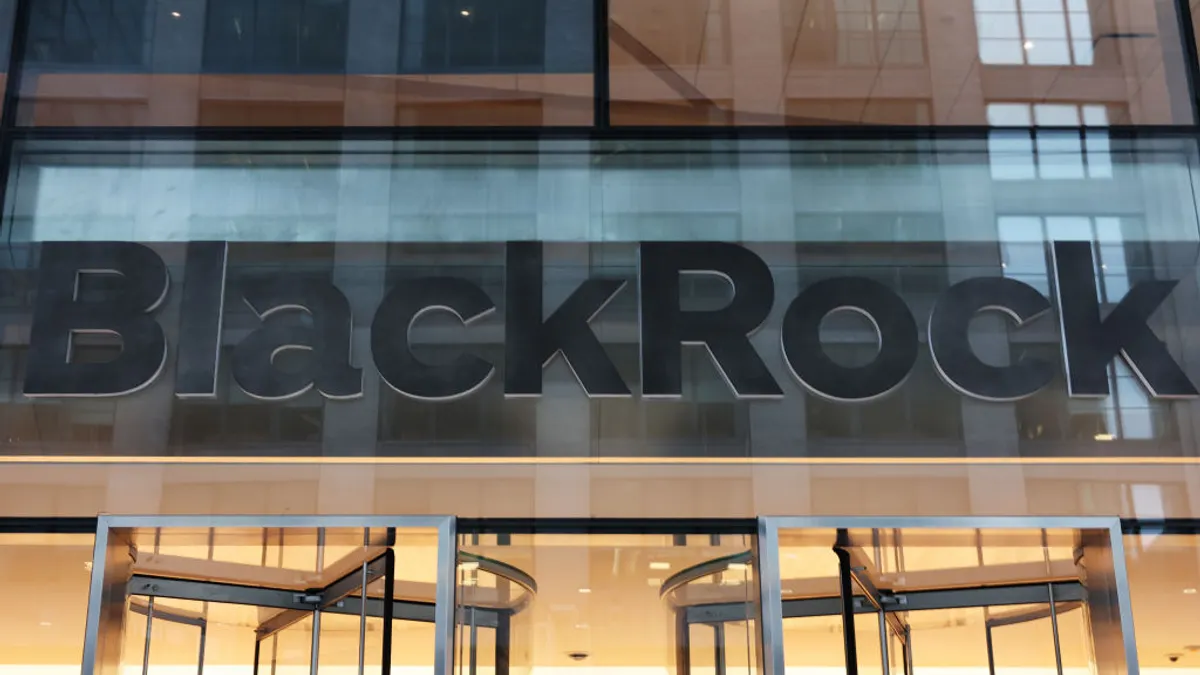Dive Brief:
- The Texas Comptroller’s office has removed BlackRock from the state’s list of companies who allegedly “boycott the oil and gas industry,” according to a Tuesday press release.
- State Comptroller Glenn Hegar credited BlackRock for exiting the Net-Zero Asset Manager initiative and downgrading its participation in Climate Action 100+, which he said was “directly related to [the state’s] listing process” in a Tuesday statement accompanying the update.
- BlackRock was among the initial 10 firms named in the divestment list published in August 2022 and, despite quarterly updates to the list, was the only U.S.-based firm listed and banned from doing business with the state.
Dive Insight:
The divestment list was created by a 2021 Texas law banning the state from doing business with companies that “limit commercial relations” with fossil fuel companies. After Hegar added London-based NatWest to the list in August 2024, the list had grown to include 16 companies and 350 investment funds that qualified for divestment. After the June 3 update, the list stands at 15 companies — all based outside of the U.S. — and 332 funds.
Hegar said, in addition to BlackRock’s changed participation in industry climate groups, the nation’s largest asset management firm “dramatically reduced the number of fund offerings that prohibit investments in oil and gas” and has “acknowledged the real social and economic costs, both in Texas and globally, that come from limiting investment in the oil and gas industry.”
BlackRock shifted its membership in CA100+ to a smaller international arm of its business in February 2024; more than 70 investors have left the group since House Republicans began probing its membership. BlackRock’s exit from NZAM this January prompted the United Nations-backed group to suspend all operations while it undergoes a full review of its program.
The Texas comptroller said his team hoped to create a process “that gave companies a clear understanding of how they got on our list and a definitive path to removal” and BlackRock took steps to ensure they were removed.
“This is a meaningful victory and validates the leadership Texas has shown on this issue, which has seen a monumental shift in the way companies, governments and individual Americans view the energy sector,” Hegar said. “While it took [BlackRock] longer than others in the financial sector to make the shift, the end results are what matter.”
The removal of BlackRock from the state’s divestment list comes after the Texas Permanent School Fund pulled $8.5 billion in funding from the asset manager to comply with the state law. At the time, a BlackRock spokesperson told ESG Dive that the divestment was “arbitrary” and ignored the firm’s “$120 billion investment in Texas public energy companies.”
Hegar said Tuesday that BlackRock has shown “real commitment to overall policy changes and a desire to act as a trusted partner in the growth of the Texas economy” by supporting the creation of the Texas Stock Exchange and "limiting support for activist shareholders to curtail fossil fuel investments.” However, Hegar said that assessment and those actions are “unrelated to [the state’s] listing decision.”
While BlackRock is no longer on the divestment list, the firm is still a defendant, along with Vanguard and State Street, in a lawsuit filed by Texas Attorney General Ken Paxton accusing the asset managers of forming a “cartel” to artificially restrict the coal market. The nation’s largest three asset managers have denied the allegations and filed a joint motion to dismiss the lawsuit, though the Federal Trade Commission and Department of Justice issued a joint statement last week siding with Paxton and 10 other Republican-led states’ view of the case.
BlackRock is also facing scrutiny from congressional Democrats for its climate alliance walkbacks. The firm was one of 12 major U.S. banks and financial institutions that received a letter from Democratic lawmakers which sought to understand where the company’s current climate commitments stand.
BlackRock did not immediately respond to a request for comment.















